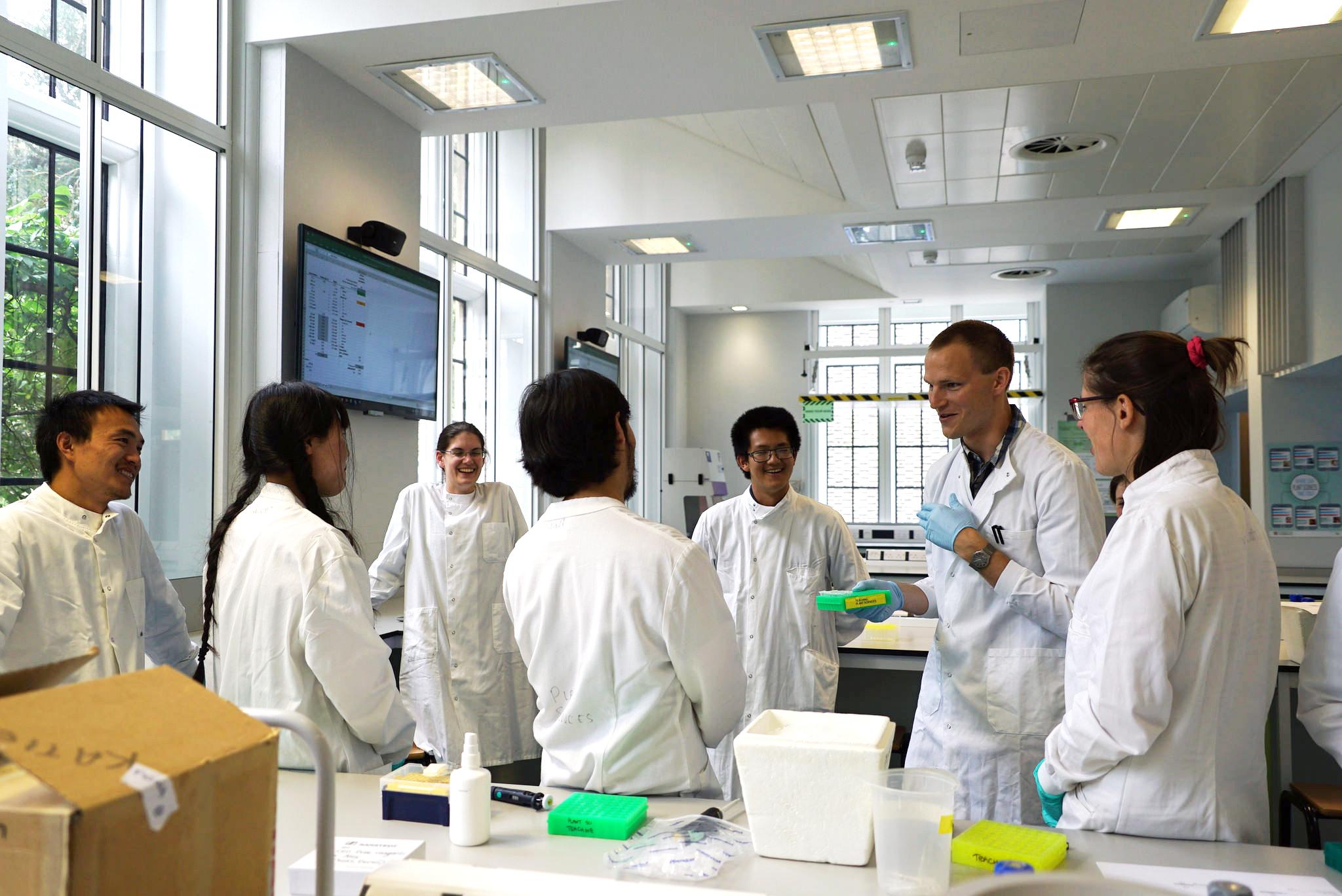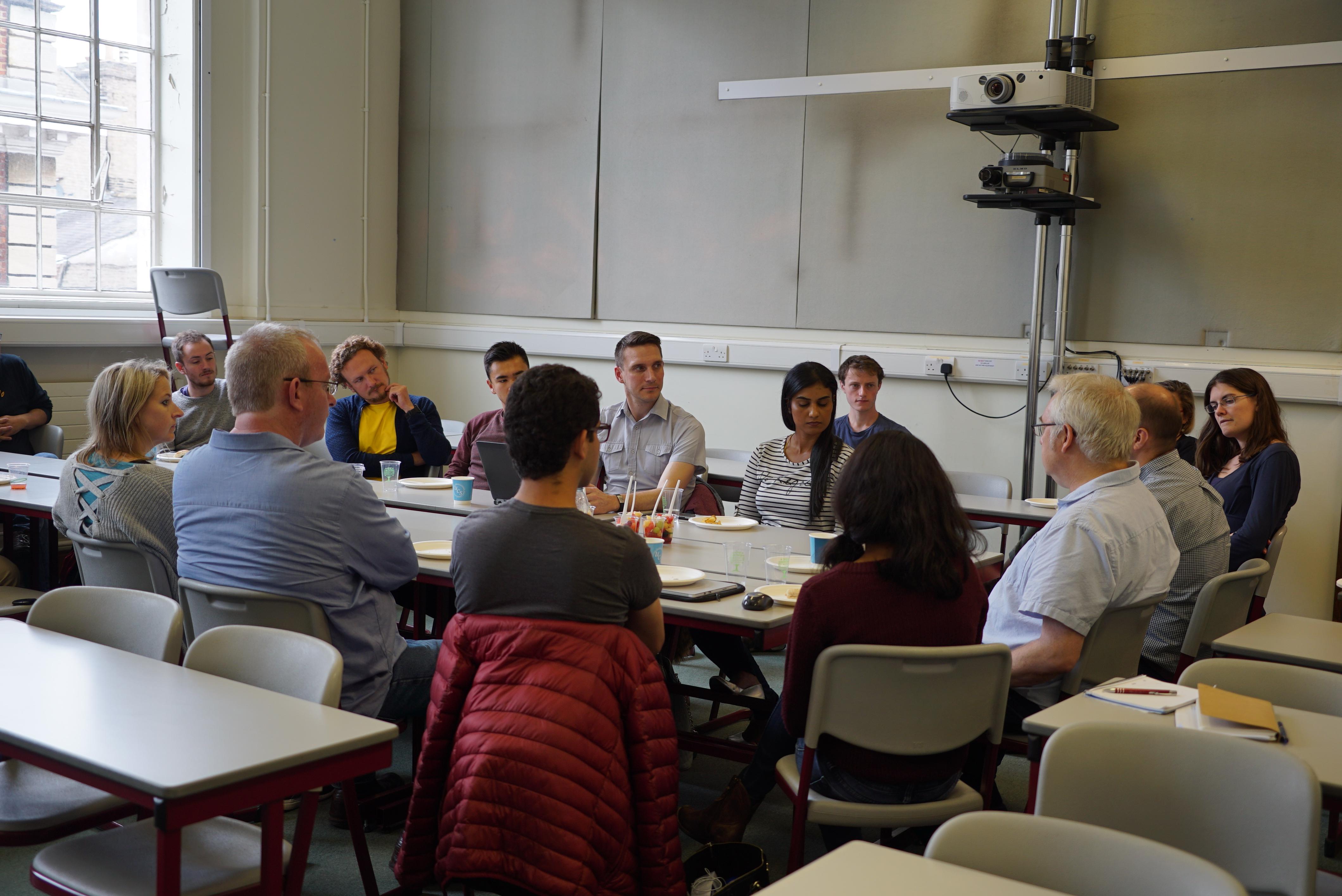Isoprenoids are an attractive class of metabolites for enzymatic synthesis from renewable substrates. However, metabolic engineering of microorganisms for monoterpenoid production is limited by the need for time-consuming, and often non-intuitive, combinatorial tuning of biosynthetic pathway variations to meet design criteria. Towards alleviating this limitation, the goal of this work was to build a modular, cell-free platform for construction and testing of monoterpenoid pathways, using the fragrance and flavoring molecule limonene as a model.
Recent technical advances in the preparation of microbial cell-free extracts have given rise to a new class of highly efficient systems for gene expression that are cheap to deploy and have huge potential benefit for the provision of a wide variety of diagnostics, sensors, vaccines and research materials. Cell-free synthetic biology is thus a topic of growing interest to many groups in Cambridge and the Synthetic Biology SRI is pleased to share its programme of activities to promote and support interdisciplinary work in this space.
If you'd like to receive updates on cell-free related news, publications, and events, sign up to our mailing list or check out our upcoming events on Meetup.


Join our monthly cell-free lunch meeting!
We meet on the first Tuesday of every month at 12pm with students, researchers, and commercial partners leading or contributing to a cell-free related project. All are welcome. Lunch provided!
Please find details of upcoming meetings at the links above.
Past Speakers & Themes
-
- Trevor Hallam (Sutro BioPharma) on strategies for large scale in-vitro expression
- Quentin Dudley (Earlham Institute, Norwich) on cell-free protein synthesis of plant proteins. More info
- Kevin Land and Suzanne Smith (CSIR, South Africa) on low-cost viral diagnostics. More info
- Jenny Molloy (Shuttleworth Fellow) on genetic circuits and hardware for cell-free experiments
- Anibal Arce (Federici lab, Pontifical Catholic University of Chile) on addressing batch-to-batch variability for robust biosensing purposes using cell-free reactions. More info
- Harry Akligoh (Kumasi Hive, Ghana and Open Bioeconomy Lab) on cell-free potential for synbio education and diagnostics in low-resource settings. More info
- Chiara Gandini (Bioeconomy Lab) on investigating and addressing fundamental issues in the access to biological reagents; and developing research tools to make biotechnology accessible, used, and useful in resource-constraint contexts. More info
- Cassi Henderson (Lisa Hall Lab, Dept. of Chemical Engineering & Biotechnology) on rethinking biosensors for low-resource settings. More info
- Emzo de los Santos (University of Warwick) on cell-free as a rapid prototyping platform for synbio and natural products research More info
- Simon Moore (University of Kent) on Streptomyces cell-free transcription and biosynthesis More info
Why is cell-free synthetic biology important?
The field of Synthetic Biology is introducing low-cost, breakthrough technologies for a wide range of practical challenges including diagnostics, environmental conservation, microbial bioproduction, crop improvement and human health. Biological engineering can play an important role for the future well-being and economic development of sustainable societies in all parts of the world.
Synthetic biology offers new tools and approaches
-
-
Standardised, modular DNA parts and rapid assembly of genetic circuits for reprogramming biological systems.
-
Cell free expression systems that do not require containment, and can be freeze-dried and stored at ambient temperatures to eliminate the need for refrigeration.
-
Transient gene expression in contained hosts, and transgene-free genome editing to avoid the costs, resources and regulatory hurdles associated with the deployment of genetically modified organisms.
-
Legal frameworks, repositories and open technologies for the open exchange of genetic materials.
-
International efforts to develop open standards and protocols for DNA parts and tools provide a major impetus for technology transfer, with benefits for (i) rapid-response production of vaccines and biologics, (ii) point-of-use diagnostics and field biosensors, (iii) agricultural crop improvement using non-transgenic (genome editing) tools, and (iv) harnessing local biodiversity to build sustainable bioeconomies.
There are several main obstacles to development of new educational resources and research tools based on cell-free systems:
1. Availability of low-cost cell-free extracts.
2. Low cost instrumentation and lab equipment.
3. Accessible and and modular technical resources for customised curriculum development.
4. Building local expertise and capacity through shared knowledge and exchange of open-source tools and materials.
What we are doing to promote cell-free synthetic biology:
- Monthly lunch meetings to bring together students, researchers and commercial partners working on cell-free projects and technologies
- Workshop on cell-free synthesis of plant proteins with Quentin Dudley (Earlham Institute, Norwich)
- Hands-on demo of cell-free bead beating with Quentin Dudley and Emma Talbot (University of Cambridge)
- Seed-funding challenges Biomaker and OpenPlant for interdisciplinary teams to build low-cost, open-source tools for biology including cell-free related projects
- The award of a £1.8m EPSRC GCRF grant for development of cell-free norovirus and HIV diagnostics
- Workshops on cell-free funded by the GCRF and SRI including speakers such as Vincent Noireaux and Keith Pardee, hands-on practical and a public workshop prototyping a DNA NAND gate at Cambridge Makespace
- Sensor CDT Team Project on a cell-free arsenic biosensor
- OpenDiagnostics i-Teams and social enterprise
- Cambridge University Synthetic Biology Society team project
- OpenPlant Working Group on open curriculum development for cell-free synthetic biology
- OpenPlant GCRF Workshop in South Africa and report on 'Capacity building for the Bioeconomy in Africa'
Cell-free Synthetic Biology News
The SynBio SRI event series Science Makers took on the theme of DIY DNA circuits in November 2017. Attendees constructed a NAND logic gate and a DIY visualiser using an LED grid and laser cut box designed by Helene Steiner, a member of the SRI Steering Committee.
Whatever your discipline or age Biohackathon 2017 is open to all and encourages diverse people of any age, coming up with diverse solutions, from any discipline. Whether you are a designer, artist, actor, scientist, MBA, engineer, mathematician or programmer you are welcome to apply.
In vitro or cell-free synthetic biology is a topic of growing interest to many groups in Cambridge and the Synthetic Biology SRI is pleased to announce an upcoming programme of activities to promote and support interdisciplinary work in this space.

